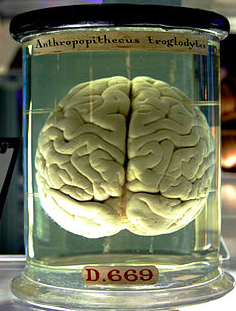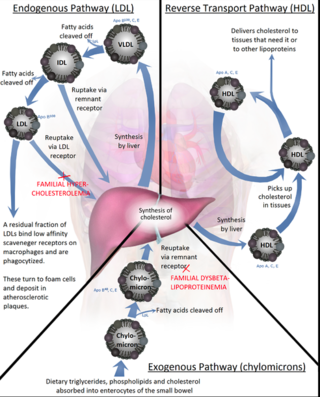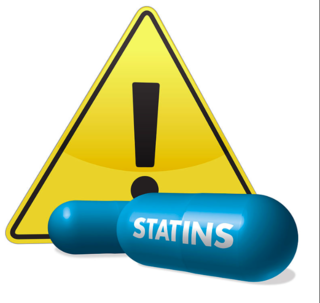Suicide
Low Cholesterol and Suicide (Again)
Another study links low cholesterol to depression and suicide attempts.
Posted March 11, 2018

The human brain needs a lot of cholesterol to wrap around nerves, to serve as components of cell membranes, and to aid in the communication between neurons. While cardiologists have been racing to lower serum cholesterol more and more (and drug companies keep coming up with fancy new cholesterol-lowering drugs*), the importance of cholesterol in the brain relative to cholesterol and heart health has been mostly ignored.
It was felt that lowering serum cholesterol wouldn't have much effect on the brain for a couple of reasons: Most of the cholesterol used in the brain is made in the brain (cholesterol from the blood doesn't really get into the brain, which is separated by the blood-brain barrier), and most of that has a pretty low turnover. The cholesterol that wraps around nerve sheaths tends to stay where it is and not float around and be recycled like the cholesterol-carrying particles in the blood.
Despite these reasonable suppositions, many studies over decades have (for the most part) consistently linked low total serum cholesterol with suicide, violence, and depression. Total cholesterol levels below 160, and especially below 130, correlate with a higher risk of mental problems. And despite the blood-brain barrier and the little movement of cholesterol from the blood into the brain, brain and serum cholesterol do tend to go up and down at the same time. There are other curious findings as well... Cholesterol tends to be lower in Alzheimer's Disease**, and cholesterol has been found to be lower during a manic episode in bipolar disorder, and tends to pop up again when the episode gets better.
Now, none of these findings prove that low cholesterol causes problems in the brain. Those affected with Alzheimer's are known to eat less, for example, due to the cognitive impairment. Depression is known to affect appetite as well. Most of the early studies linking suicide and depression and low cholesterol only checked total cholesterol levels, which we now know is an unreliable indicator of overall health (the subfraction that is HDL or triglycerides compared to the total are much better indicators of cardiovascular health), so it was hard to know what to make of the findings.

However, a Mexican study was recently published*** that can shed some light on these many questions. In this study, patients hospitalized with depression, many after suicide attempts, were compared with age and body-weight-matched healthy controls in the community. In order to remove some confounding variables, anyone with known medical conditions that affect the blood lipids, such as diabetes or metabolic syndrome, and anyone on a statin was excluded from the study. These researchers also measured the clinical lipid panel that is routinely used to measure cardiovascular risk, including HDL, LDL, triglycerides, VLDL, and total cholesterol. They used a term I've never heard before (but I like a great deal), "hypocholesterolemia," to mean folks with a total cholesterol of under 150. Over the course of several years, they managed to study nearly 500 people, enough to give the researchers some decent statistical power.
Here is the gist of what they found: Those with hypocholesterolemia were over four times more likely to have major depressive disorder, and over five times more likely to have attempted suicide. In fact, half the suicide attempters had a total cholesterol of less than 150, compared with 38 percent of the total group of depressed individuals and 14 percent of the healthy controls. Triglyceride and VLDL levels, on the other hand, were higher in the depressed and suicide-attempt group.
Again, this data doesn't tell us that low total cholesterol causes depression and suicide, but it certainly is something to look at more closely, but some basic science research could point us to a possible mechanism. It turns out that cholesterol is an essential part of something called a "lipid raft" that floats in cell membranes and is vital for neuron-to-neuron signaling. Specifically, lower cholesterol seems to directly impair the function of the 5HT-1A receptor, the most common serotonin receptor in the brain. Activators of this receptor tend to decrease anxiety, among other downstream effects relating to many other neurotransmitters that can affect depression and neuron recovery and repair. Low serotonin activity in the central nervous system has long been known to correlate with violence and suicide. This means that cholesterol depletion in the brain could plausibly lead to poor serotonin signaling and subsequent increased risk of suicidal behaviors.

Here is the important question that follows from these findings: Since millions of people are on cholesterol-lowering statin medications, could statins be causing depression and suicide? Well, the researchers in the Mexican study left out statins for a reason. They are anti-inflammatory, in addition to lowering cholesterol, and they improve lipid recycling and therefore overall lipid profiles by up-regulating the LDL receptor. While most of the original large statin studies excluded people with depressive disorders, studies directly measuring suicidality and depression in statin users did not find a correlation. In fact, due to the anti-inflammatory action of statins, they are sometimes pushed forward as possible antidepressants or potentiators of other chemical antidepressants. Statins that don't cross the blood-brain barrier, like pravastatin, also tend to have fewer cognitive effects.
My take, following the data and the thinking of the folks over at the NNT blog: I'm very suspicious of limited benefit and the probable harm from any cholesterol-lowering medicine that is not a statin. As for statins, I may anger some cardiologists by stating there is still no evidence that taking them is worthwhile if there is no personal history of cardiovascular disease, but there's also no consistent evidence they might be causing depression or suicide. There is data that a statin may be helpful to those who have known heart disease. I have some clinical anecdotes of lipophilic statins (which get through the blood-brain barrier more easily) leading to increased paranoia in a few of my patients with bipolar disorder, and certainly most doctors I know have had a few patients with noticeable cognitive fog on statins (though the overall data does not show that statins cause an increased risk of cognitive problems in general). I still think it's something to look out for on a case-by-case basis.
Don't take cholesterol levels into the basement without a good reason, and not without thinking about some possible consequences for our cholesterol-loving brains. If a CETP-inhibitor (a new kind of cholesterol-lowering drug) does finally get through phase 3 trials and comes into recommended use, let's get a good look at some depression and suicide screening to get some real data about how they affect the brain, especially in those with a history of mental disorders.
*Despite 60 years of the cholesterol heart-health hypothesis, most cholesterol-lowering medications other than statins are not in general use, having not been found to be helpful or even increasing risk of death
** "High cholesterol" over a lifetime is thought to be a risk factor for Alzheimer's, but the literature is more consistent with a low HDL or high triglyceride ratio to total cholesterol being risk factors for Alzheimer's (the same as the risk for cardiovascular disease). High total cholesterol alone doesn't correlate, and dementia patients do get lower cholesterol as the disease worsens.
***Free full text — yay! I encourage you to read it, as there are links to all the past, somewhat messy literature about this subject.
Copyright Emily Deans, M.D.




